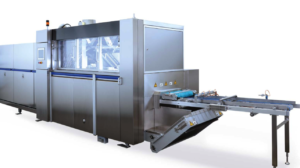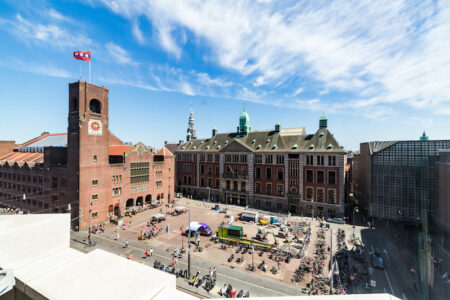Baking for a brighter future

Daisy Phillipson discusses the latest innovations in environmentally friendly bakery machinery.
Energy efficiency is a leading issue for industry worldwide. Binding legislations have been put in place to ensure countries are working towards a greener future, with Europe committing itself to increasing its energy efficiency by 20 per cent by 2020 and reducing carbon emissions by 40 per cent by 2030.
Business plays a key role in the reduction of energy use – in the UK alone, industry is responsible for 25 per cent of the total CO2 emissions, according to the Industrial Energy Efficiency Accelerator (IEEA) report by Carbon Trust. With regards to the industrial bakery sector, there is increasing opportunity to take steps towards improving energy efficiency and contributing to national targets while also cutting costs and subsequently boosting profit.
Feeling the heat
The IEEA outlines that in an industrial bakery process, the prover, oven, cooler and other machinery components typically account for around 50-60 per cent of total carbon emissions. The most significant user of energy in a bakery production line is the oven; an essential component to the process. Although there is no way to completely eliminate energy consumption and carbon emissions, industry is now working towards making it as efficient as possible.
One company that continues to innovate with this in mind is bakery machinery manufacturer Franz Haas Wafer. An example of this is its SWAKT-Eco oven – an industrial baking oven for flat and hollow wafers with a new heating process.

Franz Haas Wafer SWAKT-Eco Oven
“On our SWAKT-Eco ovens, the heating system can be adjusted and finetuned via the PLC,” says Robert Friedl, head of sales at Franz Haas Wafer. “This is revolutionary, considering that conventional systems require lengthy manual interventions (after cooling down the oven). With the SWAKT-Eco, adjustments can be done during production and results are visible immediately. The uniform heat distribution ensures highest efficiency and premium wafer sheet quality.”
On SWAKT-Eco ovens, exhaust temperature is higher compared to conventional systems, while exhaust volume is lower. “Those conditions are better suited for heat recovery systems,” adds Friedl. “The energy obtained via heat recovery systems could be used for heating of the factory, heating of fresh water or wafer book cooling, for example.”
The heating system is based upon a burner generation, which allows usage of radiation heat and requires hardly any secondary air. Due to this, the company’s engineers were able to fully isolate the baking chamber, which increases energy efficiency. Wafer sheet quality is ensured due to equal heat transfer to the baking sheets. Finally, the new burners are mounted on top of the baking plates, which means that baking residues no longer fall onto the burners and pollute them. “The clean burning process of the burners also drastically reduces emissions,” explains Friedl.
Design and production
Another company that innovates with energy efficiency is wafer machinery manufacturer Walterwerk Kiel, which says that the most important factor is the production of the plant. The company states that all of its machines are designed for optimised energy consumption. Anette Kristensen, sales employee at Walterwerk, says, “The baking plate design and the design of the heating have to match perfectly. The new baking lines Jupiter A and Jupiter C were further improved in terms of optimised heat flow.
“You have to be able to guide the energy to certain places in the oven while creating a high heat flow. The Walter baking machines work in this way and reach excellent results in terms of energy saving.”
Furthermore, Walterwerk equipped its ovens with a modern touch panel with ergonomic and simplified menu navigation and intuitive icons eliminating language barriers. “Further features like product management ensure increased ease of operation and continuous production flow as the need for unscheduled production stops and the resulting potential production waste is minimised,” adds Kristensen
Abundant savings
Koenig Maschinen, a producer of equipment for the baked goods industry, also believes that addressing sustainability issues is a “vital” responsibility for the bakery sector and the company continues to look for new ways to reduce energy consumption in its ovens. Its SE (saving energy) version of the Roto Passat rack oven, which Koenig claims can enable energy savings of up to 20 per cent compared to its predecessor, features a new heater.
“The counterflow heat exchanger is significantly more efficient and improves the heat transfer,” says a spokesperson for Koenig. “The air which flows back out of the baking chamber is heated by the flue gases from the burner chamber and flows back into the baking chamber, and the large surface area of the heat exchanger produces a high degree of efficiency.”
The Roto Passat SE, which can produce a range of baked goods including bread, rolls, buns and cakes, only needs five litres of heating oil per hour. The spokesperson explains, “If this was calculated for an entire year with approximately 4,000 production hours, energy savings would be roughly 4,000 litres of heating oil per year, while the energy consumption saving results in CO2 savings of 12 tons per year.”
Apart from protecting the environment, having a sustainable production with machinery like this can save costs for a bakery. Baking with an energy efficient oven reduces yearly production costs and moderates CO2 emissions without losing out on product quality.
A cleaner future
Of course, the baking process is only one small feature where it is possible to save energy. As Ralf Schäffer, general sales manager at Sollich, notes, “This is only one brick in the wall. We don’t make the mistake of looking at just single items of machinery, but instead focus on increasing efficiency over the whole line.”
Another brick in the energy saving wall is hygiene; the faster a manufacturer can clean the machine, the more production time they have. “Sometimes to clean the machine, you need it to be running and therefore this cleaning process needs to be as fast and efficient as possible, which subsequently saves on the amount of energy the line uses,” Schäffer explains.
For example, Sollich offers a fully automatic washing system for its chocolate enrober. “10 years ago manufacturers wouldn’t want to put water in the machine, meaning it took eight to 10 hours to wash it. Today we are able to put water in, which reduces the cleaning time to just two hours. The rest of the time the manufacturer can produce again, which saves energy,” he adds.
DEBAG Deutsche Backofenbau, producer of technology for the baking industry, is another company that continues to innovate with sustainable solutions. With regards to saving energy through easy cleanability, DEBAG offers the e.CLEAN.system: a fully automatic cleaning system that operates with a biologically degradable cleaner. This feature, along with other technologies, can significantly reduce energy consumption and the carbon footprint of a manufacturer’s ovens. Ultimately, this will decrease costs and increase profits.
The bigger picture
It is likely that legislative obligations regarding environmentally friendly and sustainable production will increase in the near future. Although the production line is only one area in which a company is able to reduce its energy consumption, it is still a manufacturer’s responsibility to make this a focal point for the entire bakery process. Investing in modern technology and innovative, energy saving solutions will reduce a company’s carbon footprint, save costs all round and therefore allow the brand to stay competitive in the evolving bakery sector.



